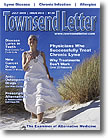| Online publication only
Experimental Double-Blind Crossover Study: For six hyperkinetic children with low whole blood serotonin levels, supplementation with vitamin B6 for three weeks increased serotonin levels and, like methylphenidate, showed trends suggesting that it was more effective than placebo in decreasing hyperkinesis. Moreover, in contrast to methylphenidate, its benefit continued into the following placebo period.
Coleman M et al. A preliminary study of the effect of pyridoxine administration in a subgroup of hyperkinetic children: A double-blind crossover comparison with methylphenidate. Biol Psychiatry. 1979;14(5):741–751.
Discussion
This study confirmed the results of uncontrolled trials which suggested that there may be a subgroup of hyperkinetic children whose symptoms are due to a deficiency of brain serotonin.1,2 Supplementation with vitamin B6, required for the conversion of tryptophan to serotonin, increased whole blood serotonin levels and, like a standard drug treatment with a stimulant, appeared to be more effective than placebo. Unlike the stimulant, its effects lasted after the children were switched to placebo, suggesting that the supplement may have corrected a preexisting deficiency.
These are exciting results, and one would think that they would have stimulated other researchers to replicate the study using a larger group of children. Such a study might achieve statistically significant results, and thus further establish the importance of routinely evaluating blood serotonin levels in hyperkinetic children. Unfortunately, pyridoxine therapy is very expensive and not patentable, so the study I am suggesting never got a sponsor to finance it.
In all fairness, a related study, with negative results, did appear as a letter to the editor in the New England Journal of Medicine four years later, and I suspect its failure to find benefit from pyridoxine supplementation discouraged researchers from pursuing the matter further.3 However, its subjects were hyperkinetic children with normal blood serotonin levels, so the study did nothing to disprove the hypothesis that pyridoxine may benefit hyperkinetic children with low blood serotonin.
With mainstream practitioners so strongly biased against the use of nutrients as therapeutic agents, I find that this sort of situation is very common in clinical nutrition research. A promising study is either neglected, or followed by a study with negative results which, however, fails to disprove the possible value of the nutrient. Despite its irrelevance, the negative study becomes the "ultimate proof" that the nutrient had been useless in treating that illness. Any practitioner using that nutrient is then subject to criticism, and no further research is conducted.
Simply obtaining a whole blood serotonin level permits the clinician to evaluate whether a hyperactive child (or adult) is an appropriate candidate for supplementation with vitamin B6. (Until further research is done, the percentage of hyperkinetic children with low blood serotonin remains unknown.) As pyridoxine megadoses can have adverse effects, I would proceed conservatively. If it is available, I would recommend pyridoxal-5-phosphate, the active coenzyme form of vitamin B6 as, in contrast to pyridoxine, there is no evidence that it can produce neuropathy in high doses.
Start with a relatively low dosage, say 25 mg of pyridoxal-5-phosphate or 50 mg of pyridoxine. (These dosages are assuming adult weights and should be adjusted downwards accordingly for children.) Gradually titrate the dosage upwards based on changes in blood serotonin levels and clinical response. Also give supplemental B complex to assure that nutriture from the B vitamins is not reduced by the supplement. If your patient improves, titrate the dosage downwards to discover the necessary dosage for maintenance – and try to ensure that the diet is a good source of the B vitamins.
There is preliminary evidence that vitamin B6 is only one of the B vitamins relevant to hyperkinesis, as there appear to be other subgroups that respond to niacin or thiamine. Deficiencies of nutrient minerals and of essential fatty acids may also be relevant, as may excess copper or exposure to lead.

Dr. Werbach cautions that the nutritional treatment of illness should be supervised by physicians or practitioners whose training prepares them to recognize serious illness and to integrate nutritional interventions safely into the treatment plan.
Notes
1. Brenner A, Wapnir R. A pyridoxine-dependent behavioral disorder unmasked by Isoniazid. Am J Dis Child. 1978;132:773–776.
2. Bhagavan HN et al. The effect of pyridoxine hydrochloride on blood serotonin and pyridoxal phosphate contents in hyperactive children. Pediatrics. 1975;55:437–441.
3. Haslam RH, Dalby JT. Blood serotonin levels in the attention-deficit disorder [letter]. N Engl J Med. 1983;309(21):1328–1329.
|



![]()
![]()
![]()

